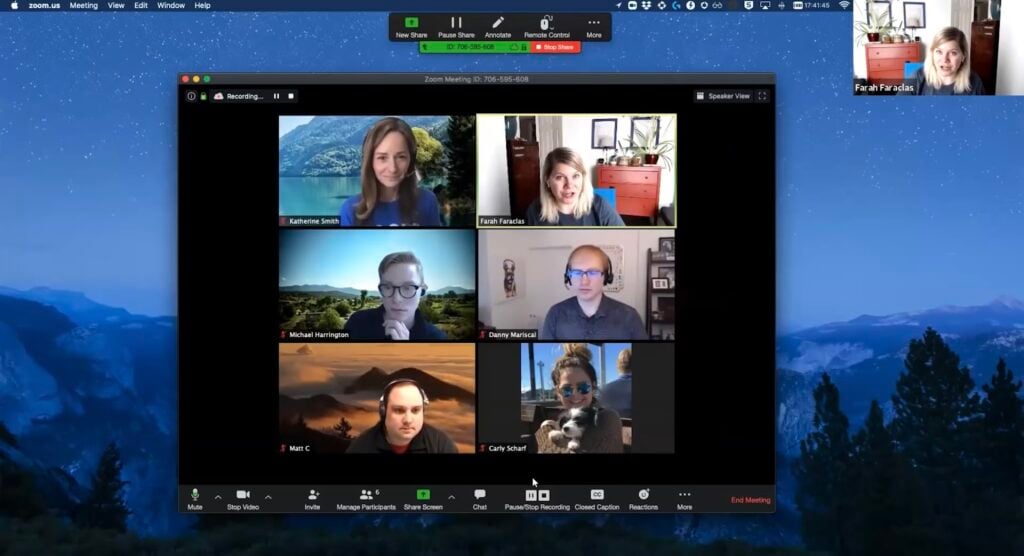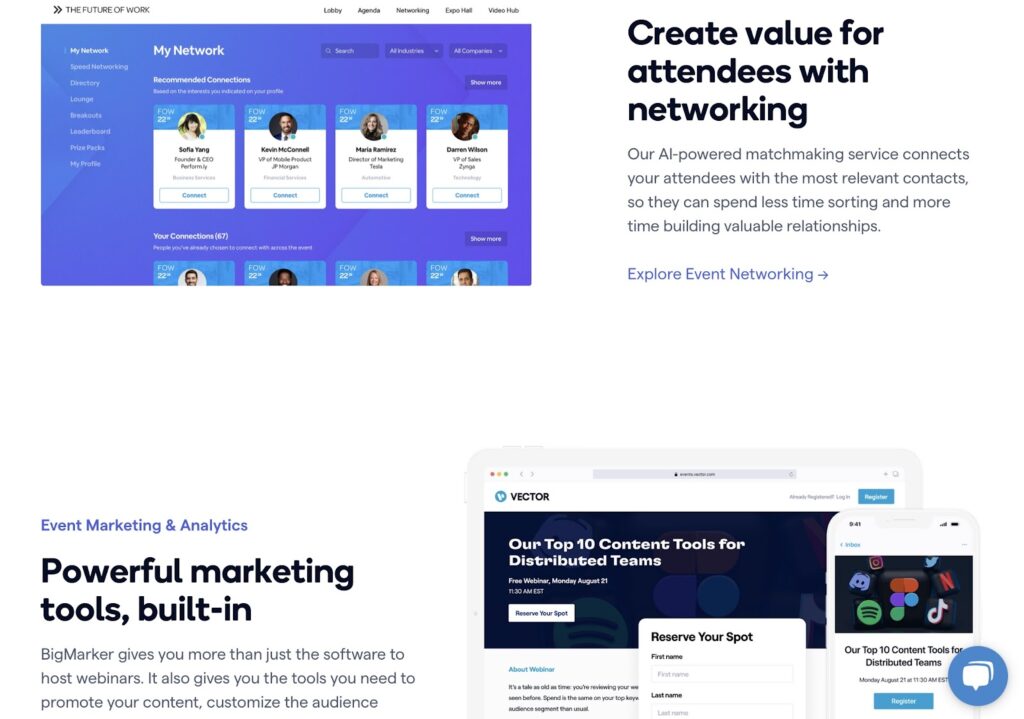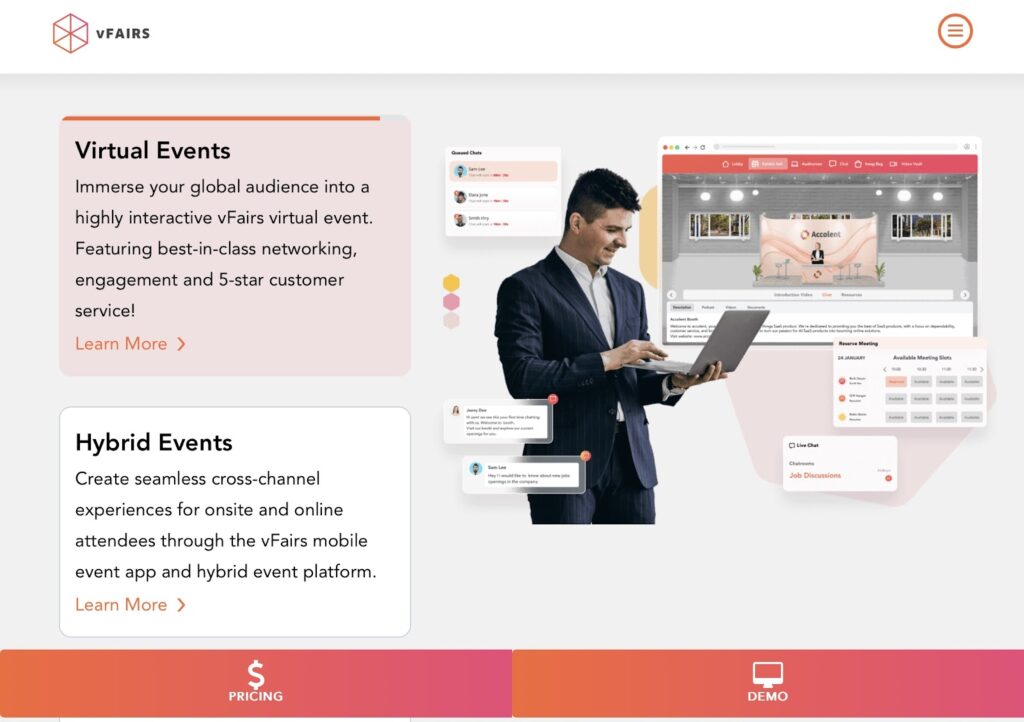With the current state of the world and the internet, gone are the days when it is necessary or even beneficial, in certain cases, to host physical events. Costs, scheduling, management, and even pure stress have paved the way for the virtual event platform route to thrive for many digital businesses and media companies.
The digital landscape at this time is so broad and flexible that you can host an expansive meeting, renowned speaker, meet-and-greet, or even full-on convention within the confines of a phone screen or computer. The likes of Zoom, GoToWebinar, SpotMe, and more are taking so much of the stress and organization out of online events.
With the emergence of digital events to the point where 40% of all global marketing events were projected to be online-only, according to Statista. There is a reason virtual event platforms take up a massive chunk of the space, and it can be highly beneficial for your company.
As someone with experience managing digital events, event registration, and attending plenty of them myself in the marketing and entertainment industries, here’s what you need to know about choosing the right virtual event platform for a fellow indie media community member like myself.
Virtual Event Platforms: What You Need to Know
Virtual event platforms are as simple or complex as you want them to be. From a glance, cloud-based software like Google Meet appears to be your basic video chat platform. Meanwhile, other places like Vimeo seem like generic live-streaming destinations for you to use to stream something.
But virtual event platforms can be so much more than that. At its core, a virtual event platform is a place where you can gather two or more people to connect fully digitally. This is without the need for anyone to leave their house or home office using its event technology.
A virtual event platform is fully scalable, too, allowing you to adjust your events online from two people to 2,000 people and far beyond that. Think of it like your own cloud-based meeting room, auditorium, stage, or convention center for you to host the same style and types of programs you would have in those traditional physical locations.
There are various types of virtual events you can host, too, such as large-scale meetings for multiple companies to gather together and discuss topics. You might have a webinar to learn more about various services and how to enhance your marketing department, for instance.
You can even have virtual conferences with speakers, slideshows, videos, live video presentations, Q&As, and anything else you can think of that you would see in a normal conference or in-person event. You can even host hybrid events with some users watching along from home and participating in the interactive elements, while also having a physical space for attendees to gather at.
Physical Events vs. Virtual Event Platforms
There are honestly pros and cons to both sides of picking between hosting a physical event versus a virtual event experience. On the physical side, you have the benefit of face-to-face interaction, which for many people, is the best way for them to remember new people and connect with them on a deeper level.
You also have the benefit of more intimate and potentially engaging activities, such as luncheons and dinners that aren’t as viable online. But you also have the cons of the overwhelming price tags for physical events, renting out spaces, and the headache of managing all of that in the first place.
On the other hand, virtual event platforms take care of most of the headaches for event planners since your budget can be a mere fraction of what a physical on-site event could be. Plus, you don’t have to compete with other media brands for the limited space in your area on a specific day. Not to mention, it is flexible so that even someone on the other side of the world can join in without having to book a flight.
However, you do have some downsides to virtual event platforms you should consider. For one, it can lack the depth and immersive feeling of a physical event. There are ways around this through interactive features and virtual booths, but there are some interactions that simply work better in person. In addition, virtual events can feel impersonal at times.
Hybrid events have a mix of the pros and cons of both sides, having the benefits of each for the overall attendee experience, while also potentially excluding some digital-only people and having the combined budgets of both.
Benefits of Virtual Event Platforms for Media Brands
For your company, in particular, there are a few notable benefits worth considering when taking a look at virtual event services. For one, you can instantly reach a global audience without the constraints of physical events for a fraction of the cost. For startups and newer brands, this is essential to success.
Better yet, many of the virtual event platforms offer dedicated data and insight into your community and the event itself that is a bit harder to parse through in person. You can know exact numbers like event attendees, and how long they participated, more easily get feedback from participants, and see how effective your engagements were.
Speaking of engagements, there is the potential for more interactivity through virtual platforms, especially in an organized and safe manner. You can set up rooms, have a more manageable schedule, and save time so workers and consumers have the chance to share their follow-up thoughts or get involved.
A digital route is also the most stress-free and appealing, not just from a logistical standpoint, but also from an environmental side. You don’t leave as much of a carbon footprint as a physical event would.
Not to mention, if you have a smaller team at this point in your growth, your attention can be better used forming the best event schedule possible, rather than wasting time and energy on coordinating with event management, renting space, setting up booths, planning catering, travel, and everything else.
How to Choose the Right Virtual Event Platform for Your Company
As the digital event space grows, there are almost too many platforms for you to choose from for your career fairs, product launches, event content, event solutions, and the like. When it comes to picking the right virtual event software for your online business, here are a few of the factors I like to keep in mind, as they are among the most crucial elements.
User experience
An event should be all about the attendees. If they aren’t having a grand time, the event is pointless. With a digital experience, the user interface, networking features, and accessibility aspects of participating in the service should be seamless and simple from the landing page to the breakout rooms to the exhibitors and more.
The same goes for the backend for you creating the event. It’s important to have depth without being convoluted and frustrating, no matter if you are on a PC or a mobile app.
Customizability
Your virtual event should be a reflection of your company. The best software out there enables you to do this with customization options and flexibility to create and do whatever you want. Of course, some companies need more engagement features than others on the event management platform, depending on what they’re doing, so it pays to compare customizable platforms.
Cost
Your budget and the amount you can dedicate to a digital event are some of the first parts you should figure out. It’s best to figure out what you would like to spend and what you might be able to squeeze out, if necessary before you start looking. This can potentially narrow down your search quite fast.
Appearance and quality
The look of a successful virtual event is immensely important in an online setting. Those little touches of your brand style or colors can help. You want an event platform that allows for that functionality, while also having quality settings as well. Being able to create interactive experiences for attendees is vital for some events and companies, and certain platforms execute these gamification-style parts better than others.
Support
One of the most terrifying parts of event organizers running an online event like an expo is the potential for real-time issues. Even ignoring internet problems, the last thing you want is the platform to crash in the middle of your guest speaker’s keynote. What is the type of on-demand support the platform offers? How do refunds work? These also vary per service, which you should consider for your virtual meeting or live event.
Best Examples of Virtual Event Platforms Worth Checking Out
The best virtual event platforms are plentiful, but I wanted to give you a few key examples to look into for your event planning. These stand out to me from a flexibility, effectiveness, templates, ticketing, video conferencing, post-event, and quality standpoint.
1. Zoom

Zoom is one of the first event spaces you likely think of when it comes to a digital event platform. Chances are, you’ve already been in a Zoom meeting or event before. It is by far one of the most accessible services in the space, with its ease-of-use for networking and the like. But these user-friendly breakout sessions and engagement tools can lack the depth of some others.
2. BigMarker

If you need to create a high-quality, massive event with different forms of webinars, meeting rooms, livestream presentations, and more, this is the one to pick. It has the flexibility to allow for different types of events all at once with incredible management possibilities. Unfortunately, this depth comes with a steep learning curve with its key features.
3. vFairs

My least favorite part about online events, and perhaps for some of your community members, is the loss in networking, fair-like quality, exhibit halls, and the like. This is the premier all-in-one platform for creating that classic convention or large-scale event feel, while also hosting great integrations with social media, email marketing, networking features, messaging, etc.
It also has solid support options that match its somewhat understandable hefty but scalable price tag.
Use Your Community Engagement to Fuel Your Virtual Events
The relationship between your community and your business should be a fully mutually beneficial one. Your job is to pour into your community to get them to want to engage more with your brand, which empowers you to do more for them, such as hosting these larger online events, summits, and trade shows.
But before you can truly dive into the world of digital events and maximize their potential, you need to deepen your community and audience engagement. One way to do this is through the best community engagement software, which can elevate your attendee engagement results when you host virtual experiences and the like.
It’s also recommended you subscribe to our newsletter, so you don’t miss out on anything like this in the future.


